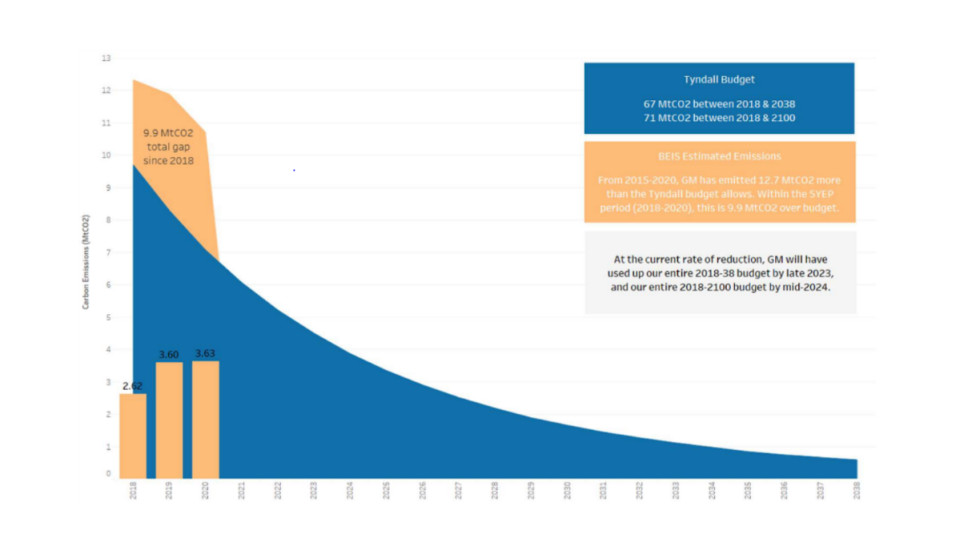Alex Edwards: My Reflections from the Greater Manchester Green Summit 2022
By Bruntwood

It was great to be part of this year’s Greater Manchester Green Summit, which was bigger and better than ever! Due to the pandemic, the 2020 Summit was held virtually and last year’s was still significantly impacted by Covid, but this year it was back with a bang with the highest numbers and two successful fringe events organised by Bruntwood.
At the ‘Future Workspaces: The Sustainability Challenge’ fringe event on 13th October I, alongside Neil Kirkby from SSE Energy Solutions, Jonny Sadler from Electricity North West and Richard Rowlands from I Want Plants, had the privilege of speaking on stage with the Mayor of Greater Manchester Andy Burnham, brilliantly hosted by Bev Taylor from Bruntwood.
For those who missed the event, it was also livestreamed, with the full session available to watch on demand and my 10 minute speech accessible on Bruntwood’s Youtube channel.
With such turmoil in the national politics arena, it’s great to see the stability we’ve got in Manchester - how all 10 of the councils that make up the Greater Manchester Combined Authority (GMCA) are united behind GMCA’s Environment Plan, how all 10 local authorities have completed a Local Authority Energy Plan and how Greater Manchester is one of only 95 cities globally to be ‘A Listed’ by the Carbon Disclosure Project.
When Andy opened the Summit, he rated Manchester’s climate action plan against three key areas:
Transport = Green
Buildings = Amber
Energy Supply = Red
Greater Manchester’s sustainable transport
To support the green rating for transport, Andy talked about the investment Greater Manchester is making in public transport with a fleet of electric buses that will come into circulation next year, made possible through putting buses under public control. The hope is that Manchester will be the first UK city to have a net zero public transport system in circa 10 years. The plan is to also make public transport more accessible and integrated by connecting trams, buses and bikes using a tap in-tap out system and capping fairs to make public transport more affordable.
Greater Manchester’s efficient buildings
Buildings were rated amber because there’s a clear strategy with some initiatives in progress, but lots of work to do, particularly on retrofit - a fact later echoed by Bev Craig, Leader of Manchester City Council. However, Manchester has built the UK’s first net zero carbon homes for social rent, with an aspiration to create a total of 30,000 homes. Furthermore, draft planning policy is written to ensure only net zero buildings are constructed from 2028.
Energy is lagging behind
Energy supply is further behind, hence the red rating. Andy identified lots of work completed to understand the scale of the task to decarbonise Greater Manchester’s energy supply, but lots investment and hard work required to implement. One great piece of news was the announcement that Carlton Power has secured planning permission for Trafford Green Hydrogen, now the UK’s largest green hydrogen scheme and can be a catalyst for more low carbon generation and greater energy security in the North West - a great milestone for Manchester to achieve this month.
Ambition vs realism
With all the positivity at the Summit, it’s easy to think we’ve cracked it, but the reality is far from this; Manchester has set an ambition to be carbon neutral by 2038, Carly McLachlan Director of the Tyndall Centre, identified that we are significantly over the carbon budget set and at the current rate of emissions the entire budget to 2038 will be spent by mid-2024.

This is the harsh reality of the situation and brought into focus by Prof Liz Price, Deputy-Pro-Vice-Chancellor for Sustainability, Manchester Metropolitan University, in one of the final sessions where she identified this reality of the current situation, identifying the requirement need to work together and get on with implementing change required to mitigate climate change now.
It’s a real danger that at events like the Green Summit the enthusiasm of like-minded individuals and organisations creates an echo chamber and we forget that we’re falling behind local, national and international targets. This was definitely loud and clear at the first fringe event we organised ‘Green Summit 2022: A look ahead to this year's event’ hosted by Bev Taylor from Bruntwood, joined by Liam Knaggs from SSE Energy Solutions, Chris Matthews from United Utilities, Liz Price from Manchester Metropolitan University, and myself.
The event gave differing perspectives from the panellists, each having their own industry specific challenges, but with a number of recurring themes:
Collaboration - The need for wider collaboration, albeit acknowledged there’s been great progress on this and certainly willingness to break down historic barriers preventing effective collaboration in support of the cause
Action - The time for talking is over, urgent action is needed now if we’re to achieve targets and avoid a climate disaster
Policy - A clear need for both local and national policies, particularly to support net zero implementation
Bruntwood’s Director of Strategy, Jessica Bowles, spoke on a panel with Andy Burnham and colleagues from across Greater Manchester to discuss how to accelerate environmental change in the region - stating that businesses should continue to lead the way in sustainability, despite changing governments in the UK - and received a round of applause for her comments from the audience.
We need to address skills and education
However, my biggest takeaway was the need to educate more young people on climate change and the desperate requirement to address the green industry skills gap; we all know the opportunity the green economy represents, but without the skills this opportunity will sadly pass us by.
What you can do to make a difference on the environment
I encourage you all to think about how you can do more, for example can you:
Promote sustainability-related learning in local schools (see the example of St Peter’s below)
Listen to the concerns raised by young people on climate change and implement action accordingly
Support education in the workplace to address the skills gap, possibly through an apprentice scheme
Drive change in the sector in which you work by ensuring your employer and supply chain invest in the education of their employees
I believe if we can get the education piece right we also have the opportunity to improve the lives of many people through connecting them with well paid, sustainable jobs, addressing poverty, diversity and inclusion issues at the same time.
I’d love to hear your feedback
I’d really like to hear any of your feedback from this year’s Summit, so if you have any thoughts on this year’s events and ideas to make future Summits even better please let me know.
Also wanted to say a massive thank you to the Bruntwood team, who worked tirelessly to support the two fringe events, in particular Dien Curtis, Craig Morley and Jade Weeder for general organisation and Bev Taylor for hosting both fringe events.
Other highlights from the Green Summit
For those of you still reading, I wanted to share my other highlights from this year’s Green Summit.
In the Summit’s opening session there was an amazing presentation by the ‘Earth Stewards’ from St Peter’s Church of England Primary School, Rochdale, who have been awarded the Eco School Green Flag Award with Distinction for their work on recycling, encouraging active travel to school and also created a natural habitat for wildlife to thrive and grow fruit and vegetables in the grounds of their school in the middle of an urban environment. The habitat provides all children across the school the opportunity to learn about the importance of sustainability from an early age and spread the message to their friends and families - see this video for more information.
We also heard from Harma Hanfi-Alf, Oldham Youth Mayor, who spoke with confidence and authority about the sustainability challenge and the need to listen to young people who continually raise the environment at one of the top issues, to protect the future of young people and demanding a voice to fight climate change. Harma also spoke of the Northern Roots, UK’s largest urban farm and eco-park on 160 acres of stunning green space in the heart of Oldham, improving the environment, wellbeing and livelihoods of local people.
I attended a great workshop in one of the breakout sessions on ‘Educating today to change tomorrow - a green skills perspective’ from Joseph Crolla, Industry Skills Intelligence Lead at GMCA, Venetia Knight, Head of Employment & Enterprise of Groundwork GM and Roosevelt Alexander, Director of the Green Skills Academy. This session highlighted a growing demand for ‘green jobs’, a significant skills gap across many sectors, some of which are likely to see fundamental change and a significant skills shortage already. Top of the list was construction, knowing how important this is to Bruntwood’s net zero ambitions and gave me concerns about how cost effective delivery can be achieved given the scale of change needed across the property sector.
These three sessions really got me thinking about how we need to focus more on the next generation, to give them the education and skills they need so they are better equipped to pick up the baton to reduce carbon emissions and act more sustainably.
To learn more about sustainability at Bruntwood, please visit our dedicated web page.
Stay Connected!
Sign up to our newsletter for the latest news, updates and offers.